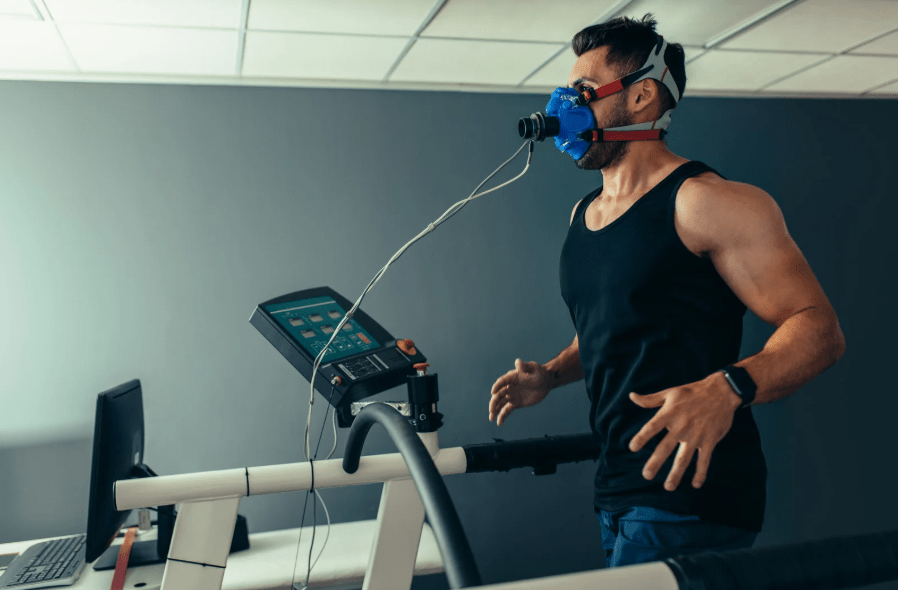The American Heart Association highlights a strong correlation between higher VO2 max levels and greater longevity. VO2 max—the maximum amount of oxygen your body can use during exercise—is now recognized not just as an athletic metric, but a critical indicator of long-term health, cognitive performance, and disease prevention. The higher your VO2 max, the lower your risk of heart disease, diabetes, and early mortality.
Unlocking the Secrets of Your Metabolism: Introducing PNOE Testing
Why Metabolic Testing Matters
Your metabolism isn’t just about how quickly you burn calories. It’s the foundation of your overall health—from energy levels and mood to your ability to recover from workouts and maintain a healthy weight. Metabolic testing gives you a window into how your body functions at rest and under stress, helping to fine-tune your nutrition, fitness, and lifestyle choices for long- term success.
The Gold Standard in Metabolic Assessment
We’re excited to introduce Metabolic testing, a cutting-edge metabolic testing system that measures your VO2max, Resting Metabolic Rate (RMR), and more. Active and Resting Metabolic testing is a non-invasive, science-backed tool used by elite athletes, health professionals, and wellness clinics around the world to analyze:
- How efficiently your body uses oxygen
- How your heart and lungs respond to stress
- How your metabolism performs at rest and during exercise
The VO2max Test: The Ultimate Indicator of Health
VO2peak is the maximum amount of oxygen your body can absorb and use during exercise. It reflects the combined health of your heart, lungs, and cells—making it one of the best predictors of longevity, chronic disease risk, and athletic performance.
A higher VO2max = lower risk of disease and better overall health.
Factors that can improve VO2max:
- Regular cardiovascular and interval training
- Adequate sleep
- A nutrient-rich diet
- Mitochondrial support
Factors that reduce VO2max:
- Cardiovascular or respiratory disease
- Chronic stress
- Smoking and alcohol overconsumption
- Weight gain
VO2max is measured during a treadmill or stationary bike test. As exercise intensity increases, oxygen demand rises, pushing your body to its peak capacity. The result? A clear snapshot of how well your body delivers and uses oxygen—a direct reflection of your metabolic efficiency and longevity potential.

What Makes PNOE So Powerful?
Four Critical Pillars of Metabolic Health
- Mental Status: A healthy mind is essential for making healthy choices. Did you know that how you breathe impacts your brain? Effective breathing supports better mental clarity, emotional balance, and decision-making.
- Heart Fitness: Your heart’s ability to pump oxygen-rich blood efficiently determines how well your body functions. Cardiovascular dysfunction is one of the leading causes of mortality and diminished quality of life. VO2 testing evaluates how well your heart handles stress and delivers oxygen to your tissues.
- Cellular Performance: Healthy cells are efficient at absorbing oxygen and burning fat, key for avoiding metabolic dysfunction and obesity. Cellular oxygen usage is a fundamental driver of high metabolism. With VO2 Testing, we can assess how effectively your cells are performing, and design a plan to improve this.
- Lung Fitness: Strong lungs are vital for longevity and quality of life. VO2 max evaluates how well your lungs transfer oxygen into your bloodstream. This is a crucial factor for endurance, recovery, and overall vitality.
Resting Metabolic Rate (RMR): Your Baseline for Weight and Recovery
Your Resting Metabolic Rate (RMR) tells you how many calories your body burns at rest to maintain essential functions like breathing, circulation, and cell repair. Understanding your RMR is critical for:
- Tailoring calorie intake for weight loss or muscle gain
- Preventing muscle loss (especially important if using GLP-1 medications like Tirzepitide, Ozempic or Semaglutide)
- Identifying hormonal imbalances (e.g., thyroid dysfunction or high cortisol)
- Avoiding overtraining, which can lower metabolism and impair recovery
RMR and Menopause: During menopause, drops in estrogen and progesterone can slow your metabolic rate. This leads to increased fat storage, decreased muscle mass, and insulin resistance. Measuring RMR can help guide lifestyle adjustments like strength training and protein-rich diets to preserve metabolic health during this transition.
RMR and Recovery: Your body needs energy to repair tissues, synthesize proteins, and recover from exercise. If your metabolism slows down—due to stress, overtraining, or under-eating— your recovery suffers. RMR testing helps ensure your body is getting what it needs to perform and bounce back.

The Takeaway: Your Metabolism Is the Gateway to Health
Whether your goal is weight loss, athletic performance, or simply feeling your best, understanding your metabolic function is essential. With metabolic testing, we can go beyond guesswork and give you a personalized roadmap to optimize your heart, lungs, mind, and metabolism.
Ready to discover how your body is truly performing?
Ask us how to book your PNOE metabolic assessment today!
To book an appointment now, call today at: 503-505-9806


